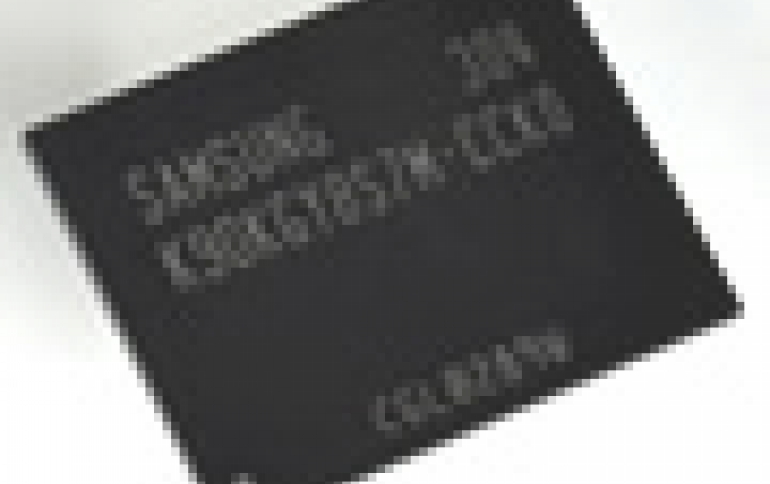
Samsung Mass Producing 128-Gigabit 3-Bit Multi-Level-Cell NAND Flash Memory
Samsung Electronics has begun mass producing a 128-gigabit (Gb), 3-bit multi-level-cell (MLC) NAND memory chip using 10 nanometer (nm)-class process technology this month.
The advanced chip will enable high-density memory solutions such as embedded NAND storage and solid state drives (SSDs).
"By introducing next-generation memory storage products like the 128Gb NAND chip, Samsung is extremely well situated to meet growing global customer needs," said Young-Hyun Jun, executive vice president, memory sales & marketing, Device Solutions Division, Samsung Electronics. "The new chip is a critical product in the evolution of NAND flash, one whose timely production will enable us to increase our competitiveness in the high density memory storage market."
 Samsung's 128Gb NAND flash is based on a 3-bit multi-level-cell design and 10nm-class process technology. It boasts the industry?s highest density as well as the highest performance level of 400 megabits-per-second (mbps) data transfer rate based on the toggle DDR 2.0 interface.
Samsung's 128Gb NAND flash is based on a 3-bit multi-level-cell design and 10nm-class process technology. It boasts the industry?s highest density as well as the highest performance level of 400 megabits-per-second (mbps) data transfer rate based on the toggle DDR 2.0 interface.
Utilizing 128Gb NAND flash memory, Samsung will expand its supply of 128-gigabyte (GB) memory cards, which can store as many as sixteen 8GB full HD video files. Samsung now will also increase its production volume of SSDs with densities over 500GBs for wider adoption of SSDs in computer systems, while leading the transition of main storage drives in the notebook market from hard disk drives (HDDs) to SSDs.
Demand for high-performance 3-bit MLC NAND flash and 128Gb high storage capacities has been rapidly increasing, driving the adoption of SSDs with more than 250GB data storage, led by the Samsung SSD 840 Series.
Samsung started production of 10nm-class 64Gb MLC NAND flash memory in November last year, and in less than five months, has added the new 128Gb NAND flash to its wide range of high-density memory storage offerings. The new 128Gb chip also extends Samsung's 3-bit NAND memory line-up along with the 20nm-class 64Gb 3-bit NAND flash chip that Samsung introduced in 2010. Further, the new 128Gb 3-bit MLC NAND chip offers more than twice the productivity of a 20nm-class 64Gb MLC NAND chip.
"By introducing next-generation memory storage products like the 128Gb NAND chip, Samsung is extremely well situated to meet growing global customer needs," said Young-Hyun Jun, executive vice president, memory sales & marketing, Device Solutions Division, Samsung Electronics. "The new chip is a critical product in the evolution of NAND flash, one whose timely production will enable us to increase our competitiveness in the high density memory storage market."
 Samsung's 128Gb NAND flash is based on a 3-bit multi-level-cell design and 10nm-class process technology. It boasts the industry?s highest density as well as the highest performance level of 400 megabits-per-second (mbps) data transfer rate based on the toggle DDR 2.0 interface.
Samsung's 128Gb NAND flash is based on a 3-bit multi-level-cell design and 10nm-class process technology. It boasts the industry?s highest density as well as the highest performance level of 400 megabits-per-second (mbps) data transfer rate based on the toggle DDR 2.0 interface.
Utilizing 128Gb NAND flash memory, Samsung will expand its supply of 128-gigabyte (GB) memory cards, which can store as many as sixteen 8GB full HD video files. Samsung now will also increase its production volume of SSDs with densities over 500GBs for wider adoption of SSDs in computer systems, while leading the transition of main storage drives in the notebook market from hard disk drives (HDDs) to SSDs.
Demand for high-performance 3-bit MLC NAND flash and 128Gb high storage capacities has been rapidly increasing, driving the adoption of SSDs with more than 250GB data storage, led by the Samsung SSD 840 Series.
Samsung started production of 10nm-class 64Gb MLC NAND flash memory in November last year, and in less than five months, has added the new 128Gb NAND flash to its wide range of high-density memory storage offerings. The new 128Gb chip also extends Samsung's 3-bit NAND memory line-up along with the 20nm-class 64Gb 3-bit NAND flash chip that Samsung introduced in 2010. Further, the new 128Gb 3-bit MLC NAND chip offers more than twice the productivity of a 20nm-class 64Gb MLC NAND chip.





















